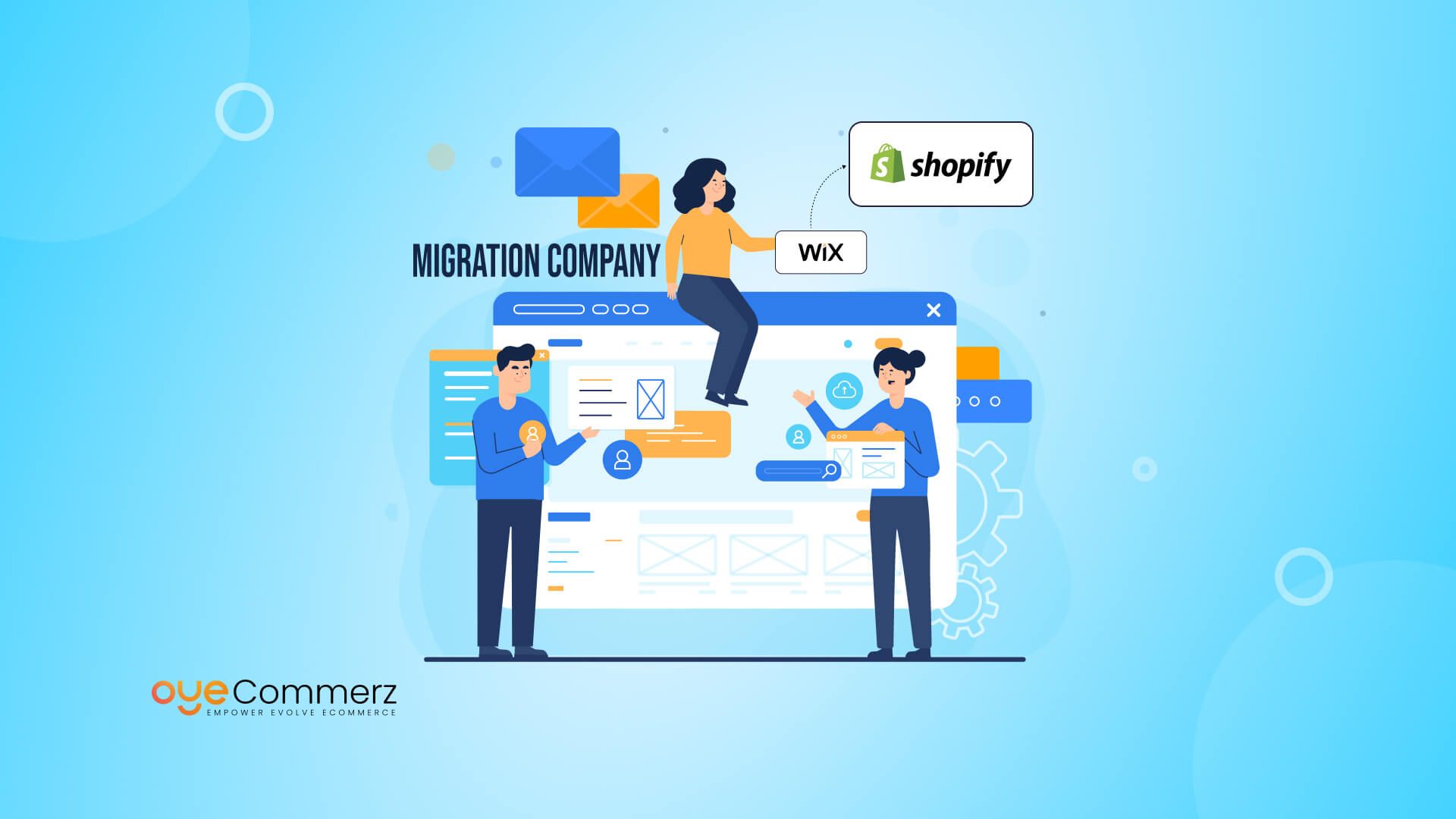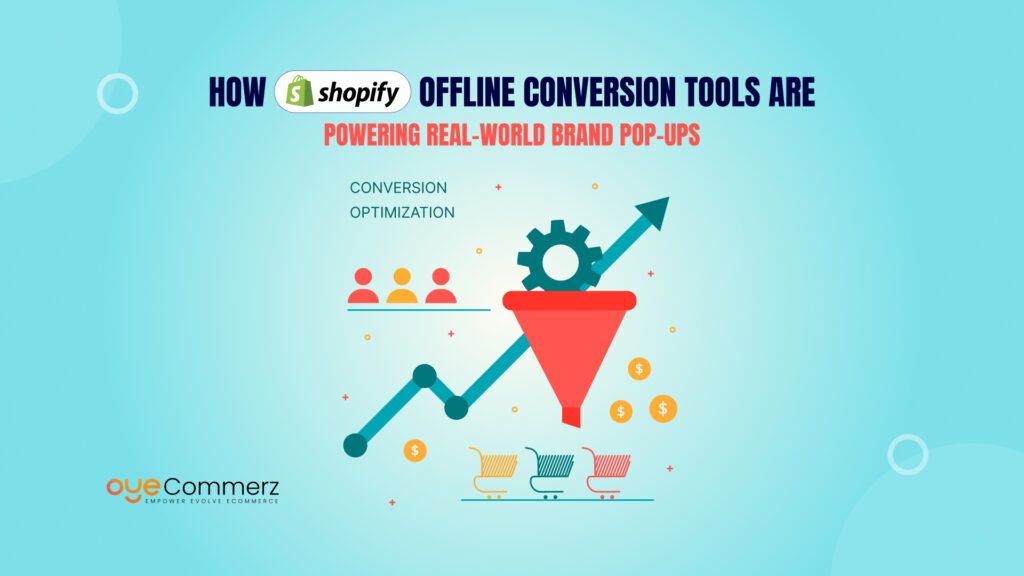Have you ever felt like your Wix website is holding your business back? Imagine this: companies that switch to Shopify often see a 30% boost in online sales within the first year. If you’re an existing Wix owner struggling with limited e-commerce tools, scalability issues, or the inability to grow your online store fully, you’re not alone. Many business owners face the same challenges.
Moving from Wix to Shopify can feel like a big step. Still, it’s also the smartest move for your business if you’re ready to scale, streamline operations, and offer your customers a seamless shopping experience. With Shopify’s robust e-commerce features, advanced SEO capabilities, and powerful integrations, it’s no wonder why many businesses are choosing Wix to Shopify migration to unlock their store’s full potential.
But here’s the catch—successfully migrating isn’t just about moving data; it’s about preserving your hard work, avoiding costly mistakes, and setting up for growth. This is why finding the right Shopify migration company is crucial. Let’s dive in and explore what to look for when making the switch.
Table of Contents
ToggleBasic Knowledge: Understanding Wix and Shopify
Migrating from Wix to Shopify is a significant decision for any business, and understanding the fundamental differences between these platforms can help you make an informed choice. Let’s break down the basics of Wix and Shopify to better understand their core functionalities and who they serve best.
What is Wix?
Wix is a versatile, user-friendly website builder designed for individuals and businesses looking to create websites quickly and without much technical knowledge. Its drag-and-drop interface and a wide array of templates make it a popular choice for personal blogs, portfolios, and small-scale online businesses.
Key Features of Wix:
- Ease of Use: The drag-and-drop editor allows users to build websites without coding skills.
- Wide Range of Templates: Over 800 customizable templates cater to different industries.
- Basic E-commerce Capabilities: Wix provides essential tools for selling online, such as product pages, shopping carts, and payment options.
- Limited Scalability: While great for small businesses, Wix struggles to meet the demands of growing online stores.
- App Market: Offers integrations for additional functionality, though not as extensive as Shopify’s app ecosystem.
Limitations of Wix:
- Limited support for larger inventory and complex e-commerce operations.
- Basic SEO tools that can restrict visibility in search engines.
- Fewer options for integrating advanced payment gateways and third-party tools.
What is Shopify?
Shopify is a leading e-commerce platform specifically designed to cater to businesses focused on selling online. With its robust infrastructure, Shopify empowers store owners to manage their inventory, process payments, and scale their businesses efficiently. Shopify’s extensive reach, powering over 5.17 million active stores and comprising 27% of global e-commerce websites, underscores its prominence as a leading e-commerce platform
Key Features of Shopify:
- E-commerce-Centric Design: Shopify’s primary focus is on creating and managing online stores.
- Inventory Management: Advanced tools for managing large product catalogs.
- Customizable Themes: Shopify offers numerous professional themes to suit various industries.
- Powerful Integrations: With access to Shopify’s app store, businesses can integrate tools for email marketing, analytics, and customer management.
- SEO-Friendly: Shopify’s built-in SEO features help improve search rankings and drive organic traffic.
Advantages of Shopify Over Wix:
- Ability to handle large-scale operations and international sales.
- Advanced analytics and reporting tools for data-driven decisions.
- Flexible payment solutions, including Shopify Payments and third-party options.
- Mobile-friendly designs to ensure seamless shopping experiences on any device.
Key Differences Between Wix and Shopify:
By understanding these platforms, you can better evaluate whether Wix to Shopify migration aligns with your business goals. The differences in scalability, functionality, and support make Shopify an excellent choice for businesses looking to scale and optimize their online operations.
Why is Migration from Wix to Shopify Needed?
If you’re considering migrating your online store, you’ve likely encountered limitations with Wix that are holding back your business growth. While Wix is a great platform for getting started, Shopify is designed to meet the needs of scaling e-commerce businesses. With the global e-commerce market reaching $6.09 trillion in 2024, transitioning to a robust platform like Shopify can position your business to capitalize on this expanding market. Let’s explore why a Wix to Shopify migration might be the game-changer your business needs.
Limitations of Wix
- Restricted Scalability
- Wix is ideal for small to medium-sized businesses, but it struggles when your store grows larger or your operations become more complex.
- Limited storage and processing capabilities can create bottlenecks as you add more products or see higher traffic.
- Limited E-commerce-Specific Tools
- Wix was not built specifically for e-commerce. Its features are basic, with fewer options for inventory management, advanced analytics, and customer segmentation.
- The lack of robust e-commerce tools makes it challenging to offer an optimized shopping experience.
- Fewer Third-Party Integrations
- Integrating third-party apps, payment gateways, and tools like marketing automation is more restricted on Wix.
- The smaller app marketplace limits customization opportunities, which can stifle innovation and growth.
- SEO Constraints
- Wix offers basic SEO capabilities, but it lacks the advanced tools needed to drive higher organic traffic and maintain search engine rankings.
- Managing site speed and URL structures can be difficult, potentially impacting user experience and SEO performance.
Advantages of Shopify
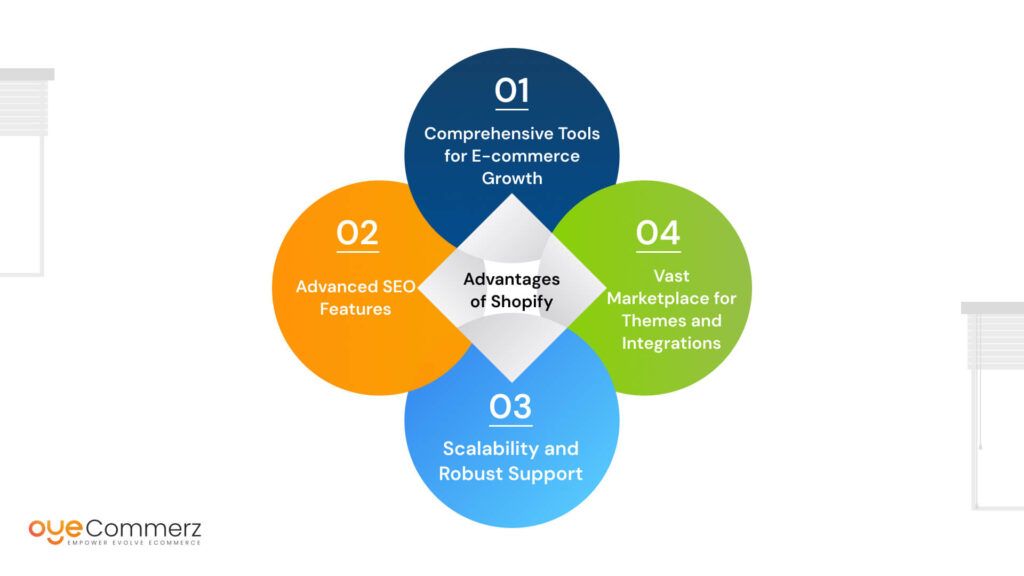
- Comprehensive Tools for E-commerce Growth
- Shopify is built with e-commerce in mind, offering features like abandoned cart recovery, multi-channel selling, and advanced inventory management.
- Its built-in tools simplify running promotions, managing orders, and enhancing customer experiences.
- Advanced SEO Features
- Shopify’s SEO capabilities include customizable meta tags, mobile-friendly designs, and fast-loading pages.
- Tools like URL redirects and sitemaps ensure your site maintains its rankings during migration.
- Scalability and Robust Support
- Shopify is perfect for growing businesses, capable of handling large product catalogs and heavy site traffic.
- Its infrastructure supports international sales with multi-language and multi-currency options.
- Vast Marketplace for Themes and Integrations
- Shopify’s app store provides access to thousands of apps for marketing, analytics, shipping, and more.
- With professional-grade themes, you can create a store that reflects your brand and meets your customers’ expectations.
The Big Picture
While Wix serves its purpose for smaller businesses or personal websites, it simply cannot match the scalability, flexibility, and advanced features that Shopify offers. Businesses making the move to Shopify experience improved operational efficiency, better customer experiences, and increased sales potential.
Challenges in the Wix to Shopify Migration Process
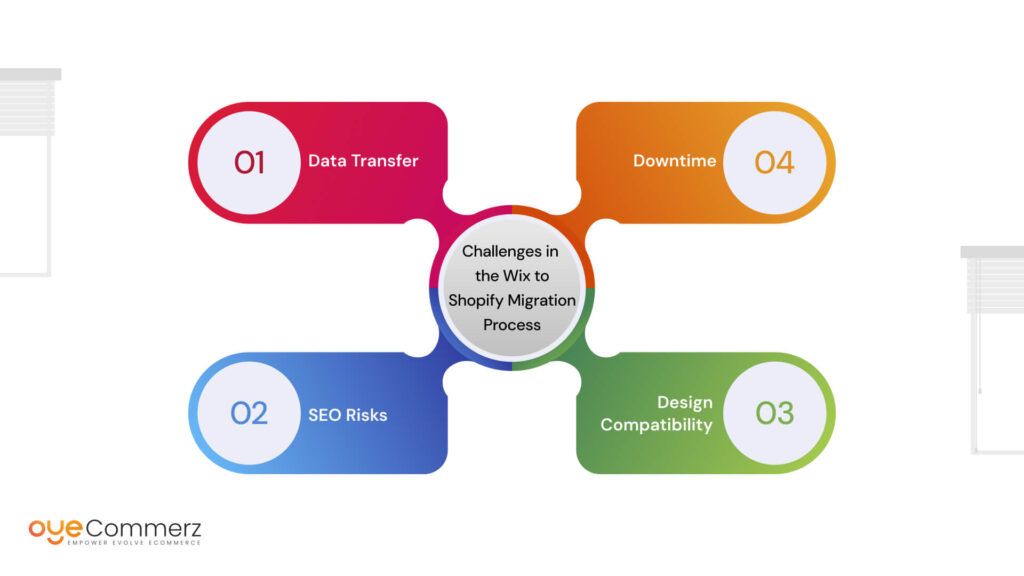
Migrating your online store from Wix to Shopify is a strategic move for business growth, but it comes with its share of challenges. Recognizing these potential hurdles beforehand can save you time, money, and unnecessary stress. Let’s explore the major obstacles involved in a Wix to Shopify migration and why they matter.
1. Data Transfer
One of the biggest challenges in migration is transferring your data accurately.
- Products: Every product in your Wix store needs to be recreated in Shopify, including descriptions, images, prices, variants, and inventory levels. Even minor errors can lead to discrepancies in inventory or confusing product listings.
- Customers: Preserving your customer database, including names, emails, purchase histories, and preferences, is critical for maintaining your marketing strategies and offering seamless service.
- Orders: Ensuring order histories transfer correctly is essential for customer service and reporting purposes.
Why It’s a Challenge:
- Wix and Shopify use different data formats and systems, making manual transfers prone to errors and data loss.
- Large stores with extensive catalogs and histories face even greater risks during migration.
2. SEO Risks
SEO is the lifeblood of organic traffic for e-commerce stores. Improper migration can significantly harm your search engine rankings.
- Losing indexed URLs from your Wix site without setting up proper redirects can result in broken links and reduced traffic.
- Metadata, alt texts, and keyword optimizations from Wix may not transfer seamlessly, potentially affecting your visibility on Google.
- Any missteps in setting up Shopify’s SEO configurations can slow down recovery and growth post-migration.
Why It’s a Challenge:
- Maintaining SEO continuity during the migration process requires technical expertise and a deep understanding of both platforms.
- Ignoring this aspect can result in a steep drop in search engine visibility and organic traffic.
3. Design Compatibility
Shopify and Wix use entirely different structures for website themes and design elements.
- Recreating your Wix store design in Shopify isn’t a straightforward process.
- If your Wix site uses custom features, ensuring those are replicated or improved in Shopify can be complex.
- Shopify’s design system offers greater flexibility, but making the most of it requires expertise.
Why It’s a Challenge:
- Recreating your store’s design while optimizing for Shopify’s advanced features can be time-consuming and expensive.
- Maintaining consistency with your brand identity is critical for customer trust.
4. Downtime
Migration often involves a period of downtime when your store is being transitioned.
- Any delays or errors during the migration process can extend this downtime, leading to lost sales and a negative customer experience.
Why It’s a Challenge:
- Prolonged downtime affects your revenue and customer trust.
- Managing an efficient transition requires careful planning and execution.
By understanding these challenges, you can plan for a smoother migration process. Let’s now discuss how hiring the right professionals can help you overcome these hurdles.
Solutions: Why Hiring a Shopify Migration Company is Essential
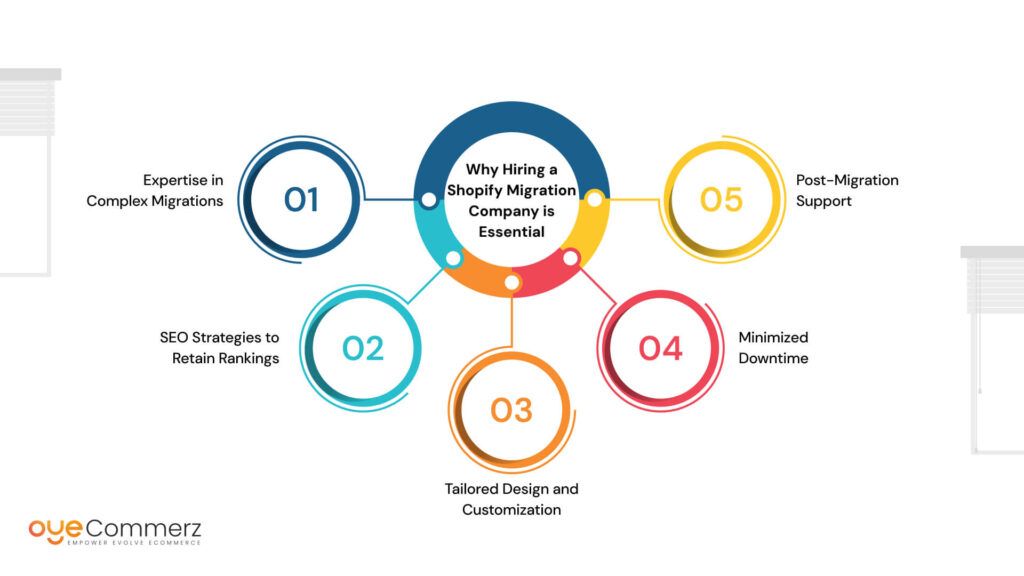
Handling a Wix to Shopify migration on your own might seem cost-effective at first, but the process’s complexity often proves otherwise. A professional Shopify migration company ensures your transition is seamless, efficient, and free from costly errors. Here’s why hiring experts is the best decision for your business.
1. Expertise in Complex Migrations
A professional migration company has the technical expertise to handle complex migrations.
- They ensure accurate data transfer for products, orders, and customer information.
- They understand how to work with the different data structures of Wix and Shopify, reducing the risk of errors.
- Large-scale migrations with thousands of SKUs, intricate designs, or custom functionalities are handled smoothly by experienced professionals.
Why It Matters:
Your store’s critical data is preserved, and the process is executed faster, saving you time and effort.
2. SEO Strategies to Retain Rankings
Professional migration services include specialized SEO experts who focus on retaining and improving your search engine rankings.
- They set up proper 301 redirects to ensure your old URLs from Wix direct visitors to the correct pages on Shopify.
- Metadata, keywords, and alt text are carried over and optimized for Shopify’s SEO framework.
- Post-migration SEO audits ensure your new store is well-optimized for visibility.
Why It Matters:
Your organic traffic remains intact, and you’re better positioned to grow your search rankings post-migration.
3. Tailored Design and Customization
Migration experts can recreate or improve your Wix store’s design on Shopify while leveraging Shopify’s advanced features.
- They ensure your store design aligns with your brand identity.
- Shopify’s flexible themes and customization options are used to enhance user experience and mobile responsiveness.
Why It Matters:
Your store not only retains its visual appeal but also performs better in terms of speed, responsiveness, and usability.
4. Minimized Downtime
Professional migration services plan and execute the transition process efficiently to minimize downtime.
- A detailed roadmap ensures your store’s data, design, and functionality are migrated systematically.
- Any issues are addressed promptly to keep your operations running smoothly.
Why It Matters:
Your customers experience minimal disruption, ensuring trust and sales continuity.
5. Post-Migration Support
Many migration companies offer ongoing support to help you settle into Shopify.
- They assist with troubleshooting, training, and integrating third-party apps.
- Regular updates and maintenance ensure your store stays ahead of the competition.
Why It Matters:
Post-migration support provides peace of mind, letting you focus on growing your business.
Things to Look for While Hiring a Shopify Migration Company
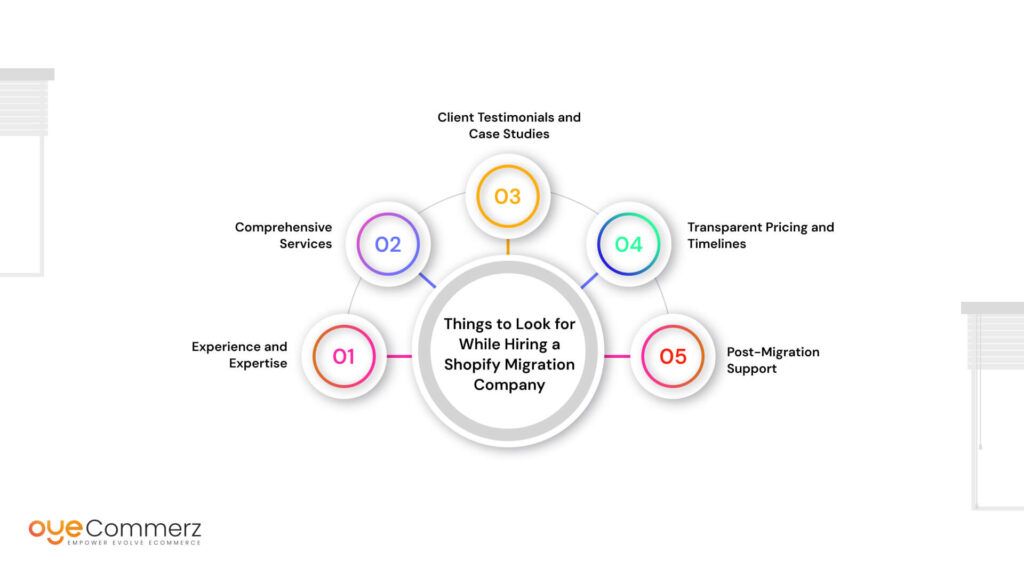
Choosing the right migration company is critical for the success of your project. Here are the factors you need to consider:
1. Experience and Expertise
Look for a migration company with a proven track record of successful Wix to Shopify migrations.
- Their portfolio should demonstrate experience with similar projects.
- The company should have in-depth knowledge of both platforms, ensuring a smooth transition.
Why It Matters:
Experience ensures your migration is handled professionally, reducing the risk of errors and delays.
2. Comprehensive Services
A professional migration company should offer end-to-end services:
- Data Migration: Safe and accurate transfer of products, orders, and customer details.
- Design Recreation: Building a Shopify store that matches or enhances your Wix store.
- SEO Retention: Strategies to maintain your search rankings during the migration.
Why It Matters:
Comprehensive services simplify the process and ensure all aspects of your store are covered.
3. Client Testimonials and Case Studies
Research the company’s reputation by reading client reviews and case studies.
- Look for businesses that have successfully transitioned from Wix to Shopify.
Why It Matters:
Positive feedback and proven results give you confidence in their ability to handle your project.
4. Transparent Pricing and Timelines
Ensure the company provides clear quotes and realistic timelines.
- Ask for a detailed breakdown of costs to avoid hidden charges.
Why It Matters:
Transparency allows you to plan your budget and expectations effectively.
5. Post-Migration Support
Select a company that offers support even after the migration is complete.
- This includes troubleshooting, training, and guidance on using Shopify’s tools.
Why It Matters:
Post-migration support ensures your store runs smoothly and adapts to future needs.
By choosing the right Shopify migration company, you can turn a complex process into a seamless experience.
Tips for Businesses New to E-commerce
Transitioning to a robust platform like Shopify can feel overwhelming, especially for businesses that are new to e-commerce. However, with the right strategies and tools, setting up a successful online store is entirely achievable. Here’s a comprehensive guide for beginners looking to establish a thriving e-commerce presence post-Wix to Shopify migration.
1. Understand the Basics of E-commerce
Before diving into Shopify, it’s essential to grasp the core principles of e-commerce:
- Target Audience: Know your ideal customers, their preferences, and shopping behaviors.
- Product Listings: Offer detailed descriptions, high-quality images, and competitive pricing.
- Customer Experience: Focus on creating a seamless shopping journey, from product discovery to checkout.
Why It Matters:
Understanding these basics ensures your Shopify store is set up to attract, engage, and convert visitors into loyal customers.
2. Leverage Shopify’s Beginner-Friendly Features
Shopify is designed to simplify the process of running an online store, making it an excellent platform for newcomers.
- User-Friendly Dashboard: Navigate and manage your store easily with Shopify’s intuitive interface.
- Built-in Tools: Access essential e-commerce features like payment processing, inventory management, and analytics without needing external tools.
- Mobile Optimization: Ensure your store is mobile-friendly with Shopify’s responsive themes.
Tip: Start with a simple yet professional theme to build your store quickly and enhance user experience.
3. Prioritize SEO from the Start
Search engine optimization (SEO) is vital for driving organic traffic to your Shopify store.
- Keywords: Use relevant keywords in product titles, descriptions, and meta tags.
- URL Structure: Keep your URLs clean and descriptive to improve search engine rankings.
- Content Marketing: Create blog posts, guides, and tutorials to establish authority in your niche.
Why It Matters:
A strong SEO foundation ensures your store gains visibility and attracts potential customers from search engines.
4. Set Up Payment Gateways and Shipping Options
Shopify makes it easy to configure payment and shipping solutions.
- Payment Gateways: Choose from options like Shopify Payments, PayPal, or third-party gateways to accept a wide range of payments.
- Shipping Settings: Define shipping zones, methods, and rates to offer transparent delivery options.
Tip: Offering free or discounted shipping can be a powerful incentive for customers to complete their purchases.
5. Use Shopify’s Marketing Tools
Shopify provides built-in tools to help you promote your store and increase sales.
- Email Marketing: Send newsletters, promotions, and updates to your customer base.
- Social Media Integration: Connect your store to platforms like Facebook and Instagram for multi-channel selling.
- Discount Codes: Run special promotions to attract new customers and retain existing ones.
Why It Matters:
Shopify’s marketing tools empower you to reach a broader audience and boost sales without requiring advanced technical skills.
6. Test Everything Before Launching
Before going live, thoroughly test your Shopify store to ensure everything runs smoothly.
- Check Product Pages: Ensure descriptions, images, and prices are accurate.
- Test the Checkout Process: Simulate transactions to verify payment and shipping setups.
- Mobile and Desktop Usability: Confirm your site is responsive and user-friendly on all devices.
Why It Matters:
A flawless launch creates a positive first impression and builds customer trust.
7. Plan for Post-Launch Growth
Once your store is live, focus on scaling your operations and attracting more customers.
- Analytics: Use Shopify’s analytics tools to monitor performance and identify areas for improvement.
- Customer Feedback: Encourage reviews and listen to customer suggestions for enhancing your store.
- Expand Your Offerings: Regularly update your product catalog to keep customers engaged.
Why It Matters:
Post-launch planning ensures your store remains competitive and continues to grow in a dynamic e-commerce landscape.
Why Choose Oyecommerz for Your Wix to Shopify Migration?
When it comes to migrating your store from Wix to Shopify, you need a partner who understands the intricacies of both platforms and can handle the process seamlessly. Oyecommerz specializes in providing expert migration services tailored to your business needs. Here’s why we’re the perfect choice.
1. Proven Expertise in Wix to Shopify Migration
At Oyecommerz, we’ve successfully handled numerous migrations, ensuring data accuracy, design fidelity, and SEO retention.
- Data Migration: Safely transfer your products, orders, and customer data without errors.
- Design Recreation: Recreate or enhance your Wix store’s design for Shopify’s robust framework.
- SEO Optimization: Implement strategies to retain and improve your search engine rankings post-migration.
Why It Matters:
With our expertise, you can focus on growing your business while we handle the technical challenges.
2. Comprehensive Migration Services
We offer a full range of services to cover every aspect of your migration:
- End-to-End Support: From data transfer to post-launch troubleshooting.
- Custom Solutions: Tailored services to meet your specific business requirements.
- Ongoing Maintenance: Regular updates and support to keep your Shopify store running smoothly.
Why It Matters:
Our all-inclusive approach ensures you get everything you need in one place, saving time and resources.
3. Dedicated Client Support
At Oyecommerz, we prioritize client satisfaction with personalized support throughout the migration process.
- Pre-Migration Consultation: Understand your business goals and customize the migration process accordingly.
- Post-Migration Training: Help you and your team adapt to Shopify’s tools and features.
- 24/7 Assistance: Available to resolve any issues that may arise during or after migration.
Why It Matters:
With dedicated support, you’re never alone in your e-commerce journey.
4. Competitive Pricing and Timelines
We provide transparent pricing structures and realistic timelines for completing your migration.
- No Hidden Fees: Our quotes are clear and upfront.
- Efficient Execution: We deliver projects on time without compromising quality.
Why It Matters:
With Oyecommerz, you get the best value for your investment.
Migrating from Wix to Shopify is a transformative step for your business, and Oyecommerz is here to make that transition as seamless as possible. Let us help you unlock the full potential of Shopify and set your business up for long-term success.
Let’s Take Your Store to the Next Level with OyeCommerz!
Are you ready to unlock the full potential of your e-commerce business? Don’t let the limitations of Wix hold you back any longer. With Oyecommerz, your migration to Shopify will be smooth, strategic, and focused on driving sales.
Contact us today for a free consultation and take the first step toward explosive revenue growth in 2025!
Contact to Migrate your Site to Shopify Now
Conclusion
Migrating your online store from Wix to Shopify is a smart step toward scaling your business and enhancing your customer experience. While Wix is great for starting, Shopify’s advanced e-commerce tools, scalability, and robust features make it the ideal platform for growing businesses.
The challenges of a Wix to Shopify migration, such as data transfer, SEO retention, and design compatibility, can be complex, but hiring a professional migration company like Oyecommerz ensures a seamless and efficient transition.
Don’t let limitations hold you back—embrace the opportunities Shopify offers. Contact Oyecommerz today for expert guidance and personalized support to take your e-commerce store to the next level. Let’s make your migration a success!

